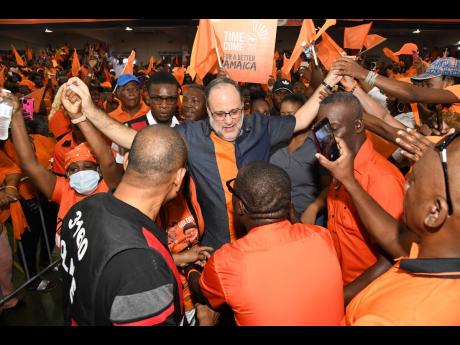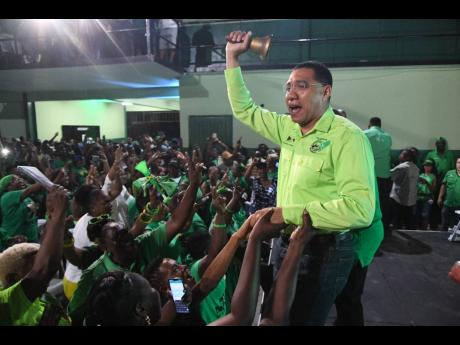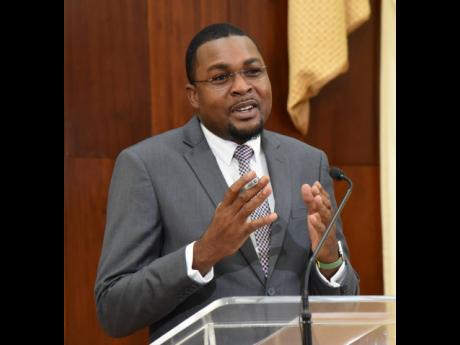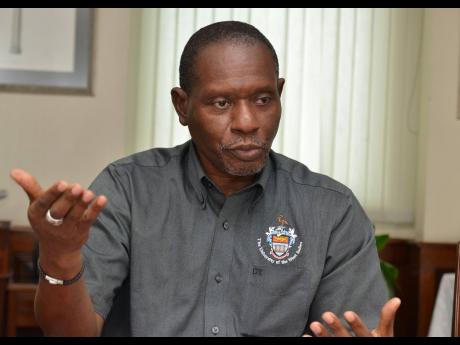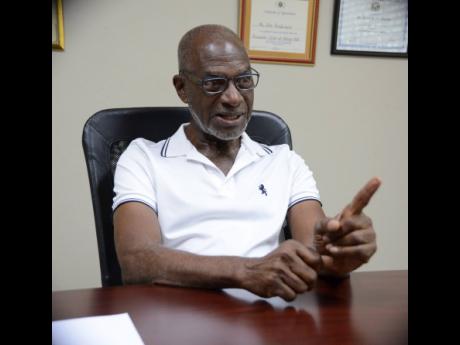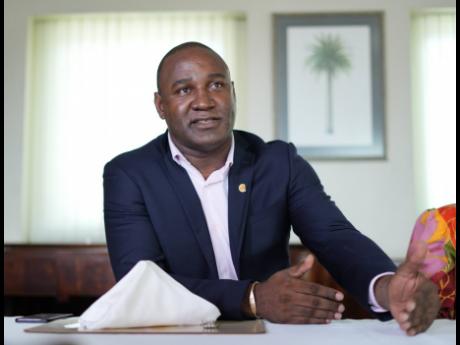DEAD HEAT
Poll reveals razor-thin margin in a PNP-JLP battle to govern
The governing Jamaica Labour Party (JLP) would find itself in a dogfight with the People’s National Party (PNP) to hold on to state power if national elections were called now, according to the findings of a new national poll. The public opinion...
The governing Jamaica Labour Party (JLP) would find itself in a dogfight with the People’s National Party (PNP) to hold on to state power if national elections were called now, according to the findings of a new national poll.
The public opinion poll was conducted between February 17 and 26 this year by the Don Anderson-led Market Research Services Limited on the request of the PNP and shared with The Gleaner.
It shows that with the Andrew Holness administration close to the midterm mark, his JLP and the Mark Golding-led PNP are in a statistical dead heat, though the PNP leads by less than half a percentage point.
According to the survey, 28.1 per cent of respondents picked the PNP, compared to 27.9 per cent who sided with the JLP when asked which of the two main political parties they would be inclined to vote for.
This is the first time in nearly six years that a public opinion poll has the PNP ahead of the JLP, according to pollster Don Anderson.
Twenty-five per cent of respondents said they would not vote or did not select any of the two parties, while 19 per cent were undecided.
The survey has a sample size of 1,002 registered voters in all parishes and a plus or minus three per cent margin of error.
The data on voter intent is based on the 44 per cent of respondents who said they are certain that they would cast a ballot if elections were called now. The remaining 56 per cent said they would not vote or were unsure.
Six months ago, a similar poll conducted by Anderson for the RJRGLEANER Communications Group found that the JLP had a commanding lead over the PNP, 31 per cent to 18 per cent.
That survey came two years after the JLP secured a second straight five-year term in office with a landslide 49-14 trouncing of the PNP in the September 2020 parliamentary elections.
‘Jlp squandered huge popularity lead’
“The JLP has squandered the huge popularity lead it had over the PNP over several years,” said Dr Christopher Charles, professor of political and social psychology at the University of Missouri in the United States.
Charles believes runaway murders, complaints of worsening economic hardship and “dizzying” levels of political arrogance are among the issues that have peeled away support for the JLP.
The crime problem, he said, has cost the JLP “dearly” because the policy talk and actions such as the routine use of states of public emergency (SOEs) have not resulted in any significant long-term reduction in murders.
According to police data, Jamaica recorded 1,498 murders last year, 1,474 the previous year, 1,323 in 2020 and 1,339 in 2018, despite repeated use of SOEs across much of the island.
The police recorded 210 murders between January 1 and March 5 this year, a 20 per cent falloff year-on-year, according to the latest statistics.
Further, Charles said the narrative by the JLP about post-COVID economic recovery and a growing macroeconomy with record low unemployment is contradicted by people’s personal economy “which is harsh”.
“The people are arguing that the JLP government has taken the political arrogance [of the PNP government of the 1990s] to new and dizzying heights,” he told The Sunday Gleaner on Thursday.
Falloff in Holness’ approval rating
For pollster Don Anderson, the slippage by the JLP is tied to the recent falloff in Holness’ approval rating.
Holness’ performance rating (‘good’ and ‘very good’) slumped to a new low in recent years of 25.3 per cent, according to the survey conducted last month.
This is a 13 percentage-point falloff of when compared with the 38 per cent approval rating he enjoyed up to July last year, based on a similar poll commissioned by the RJRGLEANER Communications Group and conducted by Anderson.
Golding, the opposition leader, also saw his approval rating (‘good’ and ‘very good’) dip from 18 per cent last July to 14.7 per cent in last month’s survey.
“The market leader, the Government, the JLP is most vulnerable because they are the ones that people are looking on and saying ‘boy, you are the one that’s directing my fortunes and controlling my fortunes’,” Anderson explained.
“So where you have the performance rating slipping for the leader and the party, it is normal to expect that people will say ‘boy, let me give the PNP a chance’,” he added, explaining the upward movement of the PNP.
According to Anderson, among those who said they would vote for the PNP, 46 per cent cited party loyalty and tradition, the largest single reason.
Give the pnp ‘a chance’
In recent years, the 84-year-old political organisation has been dogged by infighting and divisions, triggered mainly by contentious internal elections to select two of the three party presidents in the last 10 years, including back-to-back presidential contests in 2019 and 2020.
“Those have left some wounds in their wake. We have made deliberate intentional efforts to bring the party together and we have taken deliberate efforts to re-energise our base and I think what you are seeing is that base being re-engaged and re-energised,” said PNP General Secretary Dr Dayton Campbell, while acknowledging that there is more work to be done.
Anderson noted that 27 per cent of those who are inclined to vote for the PNP believe it has the nation’s best interest at heart, 21 per cent say the party would better manage Jamaica’s economic affairs, while 17 per cent say the PNP has a better track record of managing the country.
Ten per cent chose the PNP simply because they wanted to give the party “a chance”, Anderson disclosed, citing poll data.
“It’s not the biggest reason by any means. But when you have that as a reason in a situation where there is a dead heat it’s an important factor,” he said of voters wanting to give the PNP a chance.
But any celebrations within the ranks of the PNP would be premature as, according to Anderson, the voting intent data suggests that the electorate is in a “state of flux” over which party controls state power.
Further, he said when viewed in the context of the other poll results that were released over the past week, the findings suggest that there is “a level of disappointment” with both the PNP and the JLP.
“People are a little dissatisfied with what is taking place and this is what is actually conditioning how they view things right now and how they are likely to vote,” Anderson reasoned.
The PNP general secretary called the latest poll results significant and encouraging, especially since the party has not yet installed candidates in a majority of the 63 constituencies, and believes the Opposition is seeing the benefits of doing its job sufficiently and holding the Government to account.
“We’ve put forward one or two alternatives along the way but we haven’t really put forward our entire policy platform. But I think we have done sufficient to say to the people that what is being done now can be done differently,” Campbell said during a Sunday Gleaner interview on Friday.
As an example, he said the PNP, which has voted in recent months against extending several SOEs, was able to tame the crime monster during its last tenure in office without relying on the emergency security measure.
Jamaica averaged nearly 1,100 murders annually during that 2011-2016 period, police data show.
“I think that based on what is taking place and our environment currently, people agree with us that some of the issues can be dealt with differently,” he added, noting that the PNP gained 10 percentage points in the new survey.
“So it’s not just a function of the loss of support for the JLP. The PNP has gotten additional support, which is encouraging.”
JLP NOT SURPRISED BY POLL RESULTS
Anderson revealed that among those voters who would cast a ballot for the JLP, 39 per cent – the largest block – said the party is better able to manage the economy, while 36 per cent cited party loyalty and tradition.
Twenty-nine per cent said the JLP has a better track record of managing the country’s affairs; 25 per cent said the party has the nation’s best interest at heart and 12 per cent said because the JLP provided more jobs, the pollster noted.
The latest poll findings came as no surprise to the JLP, given the economic challenges globally and the spin-off effects locally, according to the party’s public relations chairman Robert Nesta Morgan.
Further, he noted that a number of the projects being undertaken have never been attempted in Jamaica “to the extent that we have done it”.
He cited the construction of a new hospital, investments in the country’s national security infrastructure and record-low unemployment as examples.
“Inflation is very high, a lot of people in Jamaica are having challenges with food prices so it’s not surprising that there would be some cooling in the middle of the term,” Morgan told The Sunday Gleaner yesterday.
But he predicted that the JLP will bounce back and maintain strong confidence among the electorate once things begin to stabilise.
A positive sign for the JLP, said Morgan, the de facto information minister, is that despite a 13 percentage-point swing towards the PNP, the Opposition has not “run away” from the JLP during the “cooling” period.
“I believe that based on the fact that our manifesto is superior and our achievements are superior, when things stabilise, which they will in a few months, you will see a significant upswing in the numbers,” he predicted.
A ‘VERY BAD SITUATION’ FOR THE GOVERNING PARTY
While acknowledging the statistical dead heat between the PNP and the JLP, Dr Charles described it as a “very bad situation” for the governing party to be neck and neck with the Opposition a little over two years before national elections that are constitutionally due in 2025.
“Whenever the opposition party catches up with the governing party in terms of popularity, the poll numbers tend to get worse for the governing party over time,” said the former University of the West Indies lecturer.
Noting that the PNP still has a lot of work to do, Campbell said the push to unite the PNP, finalising a clear policy platform to present to the electorate and completing a slate of candidates are among the top priorities.
The JLP public relations chairman said the party must continue to tout its achievements, keep the Jamaican dollar stable and maintain the downward trajectory for murders and other serious crimes.
“And we have to do a lot of work in terms of dealing with the issue of food security and the affordability of goods and services in the population,” Morgan stated.

